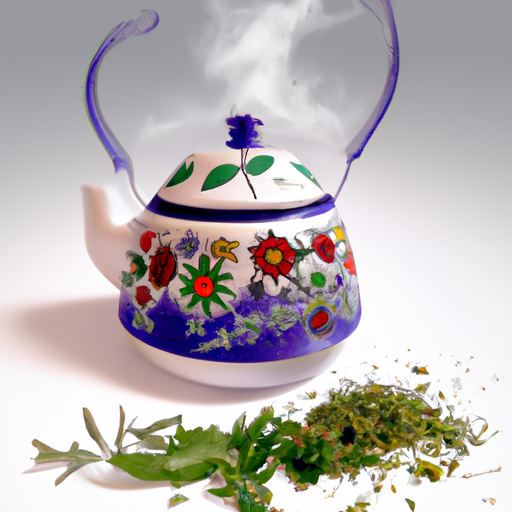Feeling overwhelmed by stress? Looking for a natural remedy to help calm your mind and soothe your soul? Well, look no further! Have you ever wondered what herbal tea is good for stress? I’m here to provide you with the answers you seek.
In today’s fast-paced world, finding a moment of peace and tranquility can be challenging. That’s where herbal tea comes in. Packed with natural ingredients known for their calming properties, herbal teas offer a gentle and holistic approach to stress relief.
Imagine sipping on a warm cup of chamomile tea, feeling its soothing effects wash over you like a gentle wave. Or perhaps you prefer the invigorating aroma of lavender tea, which not only relaxes the mind but also helps promote a restful night’s sleep.
From the refreshing burst of peppermint tea to the uplifting qualities of lemon balm tea, each herbal infusion has its own unique benefits. And let’s not forget about the powerful adaptogenic properties of ashwagandha tea and valerian root tea, known for their ability to reduce stress and promote relaxation.
So, if you’re seeking a natural way to unwind and find inner peace, join me on this journey as we explore the wonderful world of herbal teas and discover which ones are best suited for combating stress. Get ready to sip your way to serenity!
Key Takeaways
- Chamomile tea has soothing effects on the nervous system and reduces tension.
- Lavender tea helps calm the mind and promotes better sleep.
- Peppermint tea relaxes muscles, eases tension, aids digestion, and reduces anxiety.
- Ashwagandha tea reduces cortisol levels, alleviates stress and anxiety, boosts immunity, improves sleep, and enhances vitality.
Chamomile Tea
You should try chamomile tea because it’s known to help relax and calm your mind during times of stress. Chamomile has been used for centuries as a natural remedy for various ailments, including stress and anxiety. It contains compounds that have a soothing effect on the nervous system, promoting relaxation and reducing feelings of tension.
Chamomile benefits extend beyond stress relief, as it also possesses anti-inflammatory properties and can aid in digestion. To make chamomile tea, simply steep a chamomile tea bag or a tablespoon of dried chamomile flowers in hot water for about 5 minutes. Add honey or lemon for extra flavor if desired.
Moving on to lavender tea, another herbal tea that can help alleviate stress and promote relaxation.
Lavender Tea
Lavender tea is a soothing herbal tea that calms the mind and relieves tension. It’s known for its ability to help with relaxation and promote an improved mood.
I’ve personally found that drinking lavender tea before bed helps me unwind and prepares me for a restful night’s sleep.
Calms the Mind and Relieves Tension
Take a sip of chamomile tea and let its soothing warmth gently melt away your worries, like the comforting touch of a warm blanket on a chilly evening. Chamomile tea has long been known for its calming properties, making it a perfect companion for those seeking relief from stress.
Alongside meditation techniques for stress relief and breathing exercises for relaxation, chamomile tea can help calm the mind and relieve tension. This natural remedy has been backed by evidence-based research, showing its effectiveness in reducing anxiety and promoting relaxation.
Its gentle aroma and delicate taste create a holistic approach to stress relief, allowing you to unwind and find peace in the midst of a busy day. As we transition to the next section about how chamomile tea helps with relaxation and improved mood, remember that sometimes the simplest remedies can have the greatest impact.
Helps with Relaxation and Improved Mood
Indulging in a warm cup of chamomile is like embracing a tranquil oasis, where relaxation and an uplifted mood await you. Chamomile tea has been used for centuries as a natural remedy to promote relaxation and reduce stress. Not only does it have a calming effect on the mind, but it also helps to soothe tense muscles and promote a sense of well-being.
In addition to sipping on chamomile tea, incorporating breathing exercises for stress relief and meditation techniques for improved mood can further enhance its benefits. By taking deep breaths, focusing on the present moment, and practicing mindfulness, you can experience a greater sense of calm and tranquility.
Transitioning to the next section about peppermint tea, let’s explore another herbal tea that can help alleviate stress and promote overall well-being.
Peppermint Tea
Sipping on a cup of peppermint tea can instantly transport you to a calm and soothing oasis. Peppermint tea is not only delicious but also offers numerous benefits for stress relief. It contains natural compounds that have been shown to relax muscles and ease tension, promoting a sense of relaxation and improved mood. Additionally, peppermint tea has been found to aid in digestion, alleviate headaches, and reduce anxiety. To brew a perfect cup of peppermint tea, simply steep a teaspoon of dried peppermint leaves in boiling water for about 5-10 minutes. The refreshing aroma and minty taste of this herbal tea make it a delightful choice for those seeking natural remedies for stress. Now, let’s explore the benefits of lemon balm tea for stress relief.
Lemon Balm Tea
When it comes to finding natural remedies for stress, Peppermint Tea is a great option. Its soothing aroma and cooling properties can help relax both the mind and body.
But if you’re looking for another herbal tea to add to your stress-relief arsenal, look no further than Lemon Balm Tea. This delightful tea is known for its calming effects and has been used for centuries to alleviate anxiety and promote relaxation. Some of the benefits of Lemon Balm Tea include reducing stress, improving sleep quality, and enhancing mood.
To make Lemon Balm Tea at home, simply steep fresh or dried lemon balm leaves in hot water for about 5-10 minutes. Add some honey or lemon for extra flavor if desired.
Soothing, aromatic, and natural, Lemon Balm Tea is a great addition to your stress-relief routine.
Now, let’s move on to the next herbal tea, Ashwagandha Tea, and explore its stress-fighting benefits.
Ashwagandha Tea
Ashwagandha Tea, known for its adaptogenic properties, has gained popularity as a natural remedy for stress. One study has shown that regular consumption of this herbal beverage can significantly reduce cortisol levels in the body, helping to alleviate stress and anxiety. Ashwagandha benefits not only mental well-being but also physical health, as it’s believed to boost immunity, improve sleep quality, and enhance overall vitality.
It’s important to note that the dosage of ashwagandha tea can vary depending on individual needs and health conditions. It’s recommended to start with a lower dosage and gradually increase it if necessary. As with any herbal remedy, it’s advisable to consult with a healthcare professional before incorporating ashwagandha tea into your daily routine.
Moving on to the next herbal tea, valerian root tea has also been shown to have calming properties.
Valerian Root Tea
After exploring the benefits of Ashwagandha Tea, I am excited to share information about another herbal tea that is known for its calming properties: Valerian Root Tea. Valerian root has been used for centuries as a natural remedy for anxiety and sleep disorders. This herbal tea is derived from the Valeriana officinalis plant and is believed to promote relaxation by increasing the levels of gamma-aminobutyric acid (GABA) in the brain. Some studies have shown that Valerian root may help improve sleep quality and reduce the time it takes to fall asleep. However, it’s important to note that Valerian root may cause drowsiness and should be used with caution, especially when operating machinery or driving. As with any herbal remedy, it’s always best to consult with a healthcare professional before incorporating it into your routine. Now, let’s move on to the next herbal tea, Passionflower Tea.
Passionflower Tea
Passionflower tea is a wonderful herbal remedy for reducing anxiety and nervousness. It’s been shown to have a calming effect on the mind and body, helping to promote relaxation and ease feelings of tension.
Additionally, passionflower tea can also be beneficial for those struggling with sleep disorders. It can help induce a sense of calm and promote a restful night’s sleep.
I highly recommend incorporating passionflower tea into your daily routine as a natural and evidence-based way to support your overall well-being.
Reduces Anxiety and Nervousness
Relax and unwind with a soothing cup of herbal tea that helps me feel calm and less jittery. When it comes to reducing stress naturally, herbal remedies have been proven to be effective.
Passionflower tea, in particular, has many benefits for stress relief. It’s known to reduce anxiety and nervousness, allowing me to feel more relaxed and at ease. This natural remedy is a great alternative to prescription medications, as it provides a holistic approach to stress management.
Passionflower tea has been used for centuries to promote relaxation and improve sleep quality. By incorporating this herbal tea into my daily routine, I can experience the soothing effects it has on my mind and body.
As I delve into the next section about how it induces relaxation and helps with sleep disorders, I’m excited to explore even more benefits of this incredible herbal tea.
Induces Relaxation and Helps with Sleep Disorders
By sipping on this magical elixir, it’s as if a gentle lullaby is sung to your restless mind, effortlessly guiding you into a peaceful slumber. Herbal tea has long been known for its ability to induce relaxation and aid in sleep disorders.
One particular herbal tea that excels in this area is chamomile tea. Chamomile contains compounds that bind to certain receptors in the brain, promoting a sense of calmness and tranquility. It has been used for centuries as a natural remedy for insomnia and anxiety.
Drinking a warm cup of chamomile tea before bedtime can help soothe your nerves, quiet your racing thoughts, and prepare your body for a restful night’s sleep. Research has shown that chamomile tea can improve sleep quality and reduce the time it takes to fall asleep.
So, if you’re looking for a natural way to unwind and get better sleep, chamomile tea might just be the solution you’ve been searching for.
Frequently Asked Questions
Are there any potential side effects or interactions to be aware of when consuming chamomile tea for stress relief?
When consuming chamomile tea for stress relief, it’s important to be aware of potential side effects and interactions. To minimize them, consult a healthcare professional, especially if you have allergies or are taking medications.
How long does it typically take for lavender tea to have a calming effect on the body and reduce stress?
Lavender tea can have a calming effect on the body and reduce stress. It typically takes about 20-30 minutes to feel its benefits. Chamomile tea is also effective for stress relief and can provide relaxation and promote better sleep.
Can peppermint tea be consumed in the evening to help with stress, or is it more suitable for daytime use?
Peppermint tea in the evening can be a soothing remedy for stress. It’s suitable and can help calm the mind. However, be aware of potential side effects or interactions, especially if using chamomile tea for stress relief.
Is lemon balm tea safe for pregnant women or individuals with certain medical conditions who are looking to alleviate stress?
Lemon balm tea is generally safe for pregnant women and individuals with certain medical conditions. However, it’s always best to consult with a healthcare professional before using any herbal remedy during pregnancy or if you have specific medical concerns.
What is the recommended dosage or serving size of ashwagandha tea for stress management, and how frequently should it be consumed?
For stress management, I recommend a symbolic teaspoon of ashwagandha tea, twice a day. This holistic approach promotes natural remedies and evidence-based information, allowing for a balanced and soothing experience.
Conclusion
After exploring various herbal teas that are good for stress, I’m convinced that incorporating these natural remedies into my daily routine will have a profound impact on my well-being.
From the calming effects of chamomile and lavender tea to the refreshing and invigorating properties of peppermint and lemon balm tea, each blend offers a unique way to combat stress.
Ashwagandha tea, with its adaptogenic properties, and valerian root tea, known for its sedative effects, provide additional support for stress relief.
Passionflower tea acts as a gentle sedative, soothing both the mind and body.
Overall, these herbal teas offer a holistic approach to managing stress, promoting a sense of calm and balance.
So why not sip your stress away and embrace the healing power of nature’s remedies?










